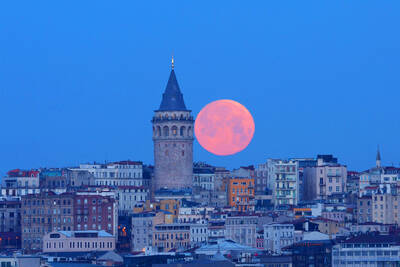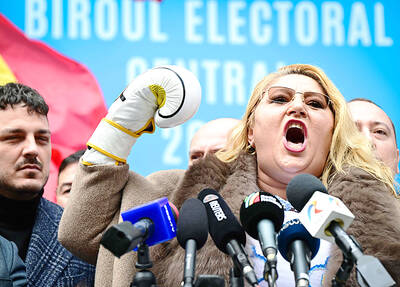It is time for the US Congress to end the restrictions that for more than half a century have prevented most Americans from visiting Cuba, a bipartisan group of senators said on Tuesday.
The lawmakers, at a news conference where they were joined by trade and human rights groups, also made clear that their proposal to allow travel should be a first step toward breaking down economic and trade barriers between the two countries.
The travel embargo, said Senator Byron Dorgan, a Democrat, is a “failed policy that has failed for 50 years.”
Lawmakers, backed by business and farm groups seeing new opportunities in Cuba, have been trying for years to chip away at the trade and travel bans imposed after former Cuban president Fidel Castro took power in Havana in 1959.
They have made little headway because of strong political resistance led by Florida’s influential Cuban-American community.
But the situation has change in the past year with an Castro turning political control over to his brother Raul and the election of US President Barack Obama, who like other Democratic presidents is more open to increasing nonpolitical contacts with the Cuban people.
The Obama administration, while steering clear of ending the trade embargo, this month backed changes making it easier for Cuban-Americans to visit and send remittances to their relatives on the island. It also is thought the administration could take other steps, such as revising rules that have impeded farm and medical sales to Cuba, before a summit of Latin American countries in Trinidad next month.
The Dorgan bill is cosponsored by Senator Richard Lugar, top Republican on the Foreign Relations Committee, among others. It would prevent the president from stopping travel to Cuba except in cases of war, imminent danger to public health or threats to the physical safety of US travelers.
Representatives Bill Delahunt, a Democrat, and Jeff Flake, a Republican, have an identical bill in the House of Representatives with 120 co-sponsors.
Dorgan said there are sufficient votes in both chambers to pass the legislation, although there is certain to be lively opposition. Senator Robert Menendez, a Democrat and the son of Cuban immigrants, slowed confirmation of several administration officials and passage of a major spending bill because that bill contained the changes in rules on Cuban-American travel.
Cuban-born Senator Mel Martinez, a Republican, said he would continue to oppose the legislation.
“This is the time to support pro-democracy activists in Cuba, not provide the Castro regime with a resource windfall,” he said.
Supporters stressed that Cuba is the only country in the world to which the US bans travel: there are a few exceptions, such as for journalists or humanitarian visits. They said open travel would make Cubans more favorable to American people and ideas.

RARE EVENT: While some cultures have a negative view of eclipses, others see them as a chance to show how people can work together, a scientist said Stargazers across a swathe of the world marveled at a dramatic red “Blood Moon” during a rare total lunar eclipse in the early hours of yesterday morning. The celestial spectacle was visible in the Americas and Pacific and Atlantic oceans, as well as in the westernmost parts of Europe and Africa. The phenomenon happens when the sun, Earth and moon line up, causing our planet to cast a giant shadow across its satellite. But as the Earth’s shadow crept across the moon, it did not entirely blot out its white glow — instead the moon glowed a reddish color. This is because the

DEBT BREAK: Friedrich Merz has vowed to do ‘whatever it takes’ to free up more money for defense and infrastructure at a time of growing geopolitical uncertainty Germany’s likely next leader Friedrich Merz was set yesterday to defend his unprecedented plans to massively ramp up defense and infrastructure spending in the Bundestag as lawmakers begin debating the proposals. Merz unveiled the plans last week, vowing his center-right Christian Democratic Union (CDU)/Christian Social Union (CSU) bloc and the center-left Social Democratic Party (SPD) — in talks to form a coalition after last month’s elections — would quickly push them through before the end of the current legislature. Fraying Europe-US ties under US President Donald Trump have fueled calls for Germany, long dependent on the US security umbrella, to quickly

Romania’s electoral commission on Saturday excluded a second far-right hopeful, Diana Sosoaca, from May’s presidential election, amid rising tension in the run-up to the May rerun of the poll. Earlier this month, Romania’s Central Electoral Bureau barred Calin Georgescu, an independent who was polling at about 40 percent ahead of the rerun election. Georgescu, a fierce EU and NATO critic, shot to prominence in November last year when he unexpectedly topped a first round of presidential voting. However, Romania’s constitutional court annulled the election after claims of Russian interference and a “massive” social media promotion in his favor. On Saturday, an electoral commission statement

In front of a secluded temple in southwestern China, Duan Ruru skillfully executes a series of chops and strikes, practicing kung fu techniques she has spent a decade mastering. Chinese martial arts have long been considered a male-dominated sphere, but a cohort of Generation Z women like Duan is challenging that assumption and generating publicity for their particular school of kung fu. “Since I was little, I’ve had a love for martial arts... I thought that girls learning martial arts was super swaggy,” Duan, 23, said. The ancient Emei school where she trains in the mountains of China’s Sichuan Province